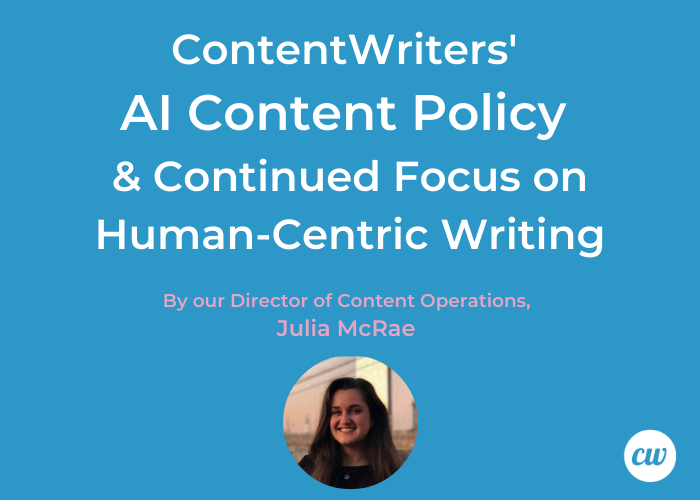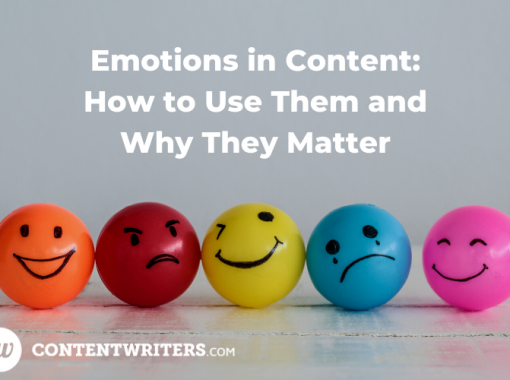
ContentWriters’ AI Content Policy & Continued Focus on Human-Centric Writing
AI has dominated the conversation in many industries since the start of 2023, and content marketing is no exception. Companies and marketing teams everywhere are considering the impact of AI content generation tools and deciding how those fit into their strategy. And while these AI writing tools are here to stay, many marketers are hesitant to embrace them, instead favoring the authenticity and authority of human writers.
There are several reasons for this, and in this post, we weigh in with ContentWriters’ AI content policy and perspective on AI writing, share background on the topic, and explain how we’ll utilize AI detection tools moving forward.
In today’s competitive and constantly changing digital world, one thing is still true – content is king. With AI-generated content in the mix, the need for quality content is higher than ever.
AI-Written Content: What We Know
There’s no denying that Large Language Models (like ChatGPT) have seen significant breakthroughs – making AI-generated content more advanced, reliable, and accessible.
At a glance, this technology is life-changing for a content marketer. Why wouldn’t you want to leverage a cheaper, faster way to create content?
Well, there are quite a few reasons. Replacing your content strategy with AI writing often isn’t the time-saving or cost-cutting solution it seems to be. AI-generators like Google Bard, ChatGPT, and even some of their paid competition can’t replicate well-researched, engaging human-generated content.
Why not? We’re glad you asked.
The Limitations of AI-Generated Content
We understand there are some benefits to using AI tools to write content. It’s low-cost, fast, and unlimited – you can create content about anything.
That said, AI-generated content presents issues that outweigh those benefits and could even cost you in other ways. Such as:
Inaccurate Information
Even the best AI content writing tools can lack the contextual understanding needed to create accurate and nuanced content.
While some businesses have switched to generating content with AI, there have been several high-profile issues, and we only expect to see more.
For example, CNET was using AI to power its publishing schedule with little oversight, and they later found that more than half of their stories had factual errors. AI bots don’t have the ability to fact-check or understand when things are out of context the way human writers and editors do.
Lack of Originality and Creativity
AI models are great at regurgitating existing information but struggle to offer unique perspectives or creative insights.
Human writers can think critically, draw from personal experiences, and vary their tone and structure, making their content engaging and thought-provoking in a way that AI bots aren’t capable of.
Ethical Concerns
AI-written content raises ethical concerns surrounding bias, misinformation, and manipulation. These models learn from existing data and information, so they can inadvertently perpetuate stereotypes, share false information, or amplify biases. Of course, human writers are not immune to biases. That said, they can reflect, analyze, and be conscious of those factors to aim for accuracy and fairness.
SEO
The jury is still out on how AI-generated content will impact SEO long-term, but there have been several case studies of companies that relied on AI content and then experienced poor website performance.
Until we have further guidance from search engines and more time to measure the long-term effects, content created by generative AI is too risky to scale.
U.S. Copyright Law
Right now, AI-generated content cannot be copyrighted. According to U.S. Copyright Office, any work created by non-humans can’t be copyrighted – including art, music, and written content.
While there is a gray area for content created using both AI and human effort, there is a minimum human authorship requirement, meaning humans would need to contribute on a larger scale to make the work eligible for copyright – so much for saving humans time.
So, overall, do the benefits outweigh the limitations? (TLDR: We don’t think so).
ContentWriters’ AI Content Policy
Knowing what we know about AI models and their current capabilities, will CW utilize them to create content?
The short answer is no, at least not for now. We’ll stick to our human-generated, human-edited content that we’re sure readers know and love.
Our Content Creation Process
ContentWriters always strives to deliver on our #1 value — being a people-first company. We want to provide businesses with content written by real people with real expertise.
For those reasons, ContentWriters prohibits writers from using AI tools at any stage in the writing process.
The only exception is during revising, editing, and proofing. Writers, editors, and proofers can use industry-accepted proofreading tools (e.g., Grammarly and Hemingway Editor) to enhance their original work.
All active writers, editors, and proofreaders in our network have agreed to this policy and signed an updated Writer Services Agreement.
That said, knowing how accessible the tools are, we’ve implemented a tool to help us monitor the content creation process.
How We Detect AI-Written Content
ContentWriters has integrated Originality.AI into our platform and workflow to monitor our writer network and detect AI-generated content.
Originality.AI is an AI detection tool that specializes in measuring the originality and authenticity of written content. Using an advanced AI-powered model, Originality scans content for patterns and measures the likelihood that the content was either human or AI-generated.
Based on what it finds, the tool assigns the piece of content an Original and an AI score. These are confidence scores, meaning the score is based on the percentage to which the tool is confident the piece was in some way written by AI, not the percentage of the piece itself.
While there are several AI detection tools on the market, Originality.AI was determined to be the most reliable tool in an internal test conducted by CW. Originality’s views on AI and AI detection align with CW’s, and we’re excited to have partnered with them to ensure our writers deliver on the promise of providing unique, original content.
CW’s platform is integrated with Originality.AI’s model, and our admins are using this as an AI-assisted review tool. If writers or editors submit content that flags too high for AI, CW admins investigate further to verify the content was indeed human-generated.
If we discover AI-generated content, it will be revised or rewritten, and we’ll address the issue with our writer. Any repeated use of AI by a writer or editor will result in them being removed from our network.
We also recognize that Originality.AI and other AI detection tools are not perfect; they can generate incorrect results. With that in mind, we’ve published guidance for writers on how to avoid AI detection false positives.
CW Understands the Value of Human Creativity
Readers, consumers, and Google all have one thing in common. They all want to get something out of the content they’re reading. ContentWriters stands by the fact that humans create well-researched, informative, and engaging content that lands with readers and search engines alike.
While AI has come a long way, it hasn’t come far enough to reach the quality standards we strive to uphold.
Contact our team for more information on our policy or our human-powered content writing services. We’re here to support clients, writers, and fellow marketers as we navigate this new landscape.

Julia McRae is our Director of Content Operations here at ContentWriters. Since joining our team in 2018, Julia has focused on nurturing strong client relationships and supporting our clients’ content writing workflows and content strategies. Her dedication to understanding and meeting our clients’ unique content needs has equipped her to lead our Content Success and Content Creation teams. Julia’s background in writing, editing, and communications has given her the expertise needed to navigate the ever-changing landscape of SEO and content creation.




